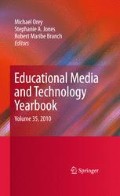Abstract
Budgetary concerns compel school administrators to decrease staff, resulting in fewer course offerings and causing small, disadvantaged schools to struggle to provide courses. Alternative educational modalities in the distance learning and online arena offer solutions. School media specialists and school counselors can lead in redesigning access to and delivery of education through a creative online approach. This chapter will present practical perspectives for school counselors and school media specialists for collaborative development and delivery of online courses in high school settings. Perspectives and suggestions linked to the critical process of developing twenty-first-century learners, based on documented research, are presented.
Access this chapter
Tax calculation will be finalised at checkout
Purchases are for personal use only
References
American Association of School Librarians & Association for Education Communications and Technology. (1998). Information power: Building partnerships for learning. Chicago: American Library Association.
American School Counselor Association. (2005). The ASCA national model: A framework for school counseling programs, Second Edition. Alexandria, VA: Author.
Anderson-Butcher, D., & Ashton, D. (2004). Innovative models of collaboration to serve children, youths, families, and communities. Children & Schools, 26(1), 39–53.
Davidson, A. L., Schofield, J., & Stocks, J. (2001). Professional cultures and collaborative efforts: A case study of technologists and educators working for change. The Information Society, 17(1), 21–32.
Doiron, R., & Davies, J. (1998). Partners in learning: Students, teachers and the school library. Englewood, CO: Teacher Ideas Press.
Dotson, K. B., & Dotson-Blake, K. P. (2009). Providing core courses online in the small rural school: Collaborative roles and responsibilities. Presented at the 10th Annual Teaching and Learning with Technology Conference.
Gardner, H. (1999). Intelligence reframed: Multiple intelligences for the 21st century. New York, NY: Basic Books.
Gross, J., & Kientz, S. (1999). Collaborating for authentic learning. Teacher Librarian, 27(1), 21–25.
Ingersoll, R. A., & Perda, D. (2006). What the data tell us about shortages of mathematics and science teachers. Paper presented at the NCTAF Symposium on the Scope and Consequences of K12 Science and Mathematics Teacher Turnover, October, 2006
Lawson, H., & Barkdull, C. (2000). Gaining the collaborative advantage and promoting systems and cross-systems change. In A. Sallee, K. Briar-Lawson, & H. Lawson (Eds.), New century practice with child welfare families (pp.245–270). Las Cruces, NM: Eddie Bowers.
Medley, K. P. (2002). Would you like to collaborate?. Library Talk, 15(1), 16–18.
Mostert, M. (1996). Interprofessional collaboration in schools: Benefits and barriers in practice. Preventing School Failure, 40(3), 135–138.
North Carolina Virtual Public Schools. (2009). Retrieved March 25, 2009 from http://www.ncvps.org/about/.
Payne, K. J., & Biddle, B. J. (1999). Poor school funding, child poverty, and mathematics achievement. Educational Researcher, 28(4), 4–13.
Toppo, G., & Gillum, J. (2009). Tide turns against schools as foreclosures rise. USA Today, March 16, 2009.
UNCG iSchool. (2009). Retrieved March 25, 2009 from http://web.uncg.edu/dcl/web/ischool/index.php.
U.S. Department of Education, Office of Innovation and Improvement. 2007. Connecting students to advanced courses online: Innovations in education, Washington, D.C.
White, M., & Wilson, P. (1997). School counselors and teacher-librarians: A necessary partnership for effective schools. Emergency Librarian, 25(1), 8–13.
Author information
Authors and Affiliations
Corresponding authors
Editor information
Editors and Affiliations
Rights and permissions
Copyright information
© 2010 Springer Science+Business Media, LLC
About this chapter
Cite this chapter
Dotson, K.B., Dotson-Blake, K.P. (2010). School Library Media Specialists and School Counselors: Collaborative Partners to Expand Distance Education Opportunities for High School Students. In: Orey, M., Jones, S., Branch, R. (eds) Educational Media and Technology Yearbook. Educational Media and Technology Yearbook, vol 35. Springer, Boston, MA. https://doi.org/10.1007/978-1-4419-1516-0_11
Download citation
DOI: https://doi.org/10.1007/978-1-4419-1516-0_11
Published:
Publisher Name: Springer, Boston, MA
Print ISBN: 978-1-4419-1502-3
Online ISBN: 978-1-4419-1516-0
eBook Packages: Humanities, Social Sciences and LawEducation (R0)

